Turkmen President Gurbanguly Berdymukhamedov paid a four-day visit to China last month. In an email interview, Kathleen J. Hancock, an associate professor of political science at the Colorado School of Mines, discussed China-Turkmenistan relations. WPR: How have political and economic relations between China and Turkmenistan evolved over the past decade? Kathleen J. Hancock: Since Turkmenistan’s independence in December 1991, its relationship with China has revolved around the supply and demand of natural gas.* While estimates have shifted over time, Turkmenistan is currently estimated to have 265 trillion cubic feet of proven reserves, making it the 12th-most-endowed country, according to the […]
Asia-Pacific Archive
Free Newsletter
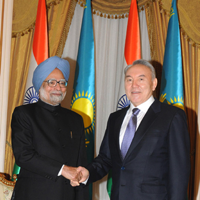
Editor’s note: This is the second in a two-part series on India’s strategic engagement in Central Asia. Part one examined ties with Tajikistan and Kyrgyzstan. Part two examines ties with Uzbekistan and Kazakhstan. Two decades of Indian engagement with Central Asia have produced relationships that are now poised to move beyond the energy and transit sectors toward more-diversified commercial investments. However, this evolution takes place against the backdrop of NATO’s imminent withdrawal from the region, at a time when India still sees national armies as the most sustainable institutions in Central Asia. In this context, Indian Army chief Gen. V.K. […]
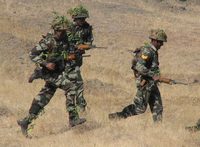
Editor’s note: This is the first in a two-part series on India’s strategic engagement in Central Asia. Part one examines ties with Tajikistan and Kyrgyzstan. Part two will examine ties with Uzbekistan and Kazakhstan.India’s engagement with Central Asia on strategic military concerns is gathering pace, with visits by high-ranking Indian defense officials and security cooperation deals underscoring the immense value New Delhi attaches to its growing military relationship with the region. The strengthened Indian presence in the area is driven by New Delhi’s desire not only to protect its emerging investments in Central Asia, but also its interests in Afghanistan […]
Indonesia and Malaysia recently began talks about their shared border near Indonesia’s West Kalimantan province, according to an Indonesian Foreign Ministry spokesman. In an email interview, Dave McRae, a research fellow in the East Asia Program at the Lowy Institute for International Policy, discussed Indonesia-Malaysia relations. WPR: What is the recent history of Indonesia-Malaysia relations? Dave McRae: Recent Indonesia-Malaysia relations have featured regular public and diplomatic controversies, but the relationship is nevertheless underpinned by solid economic ties and the routine business of bilateral cooperation. A broad range of issues have spurred tensions between Indonesia and Malaysia. The countries’ navies have […]
Turkey and China signed a deal last month for the construction of an underground natural gas storage facility at Lake Tuz in Turkey. In an email interview, Selcuk Colakoglu, an associate professor at the International Strategic Research Institution (USAK) in Ankara, Turkey, discussed relations between Turkey and China. WPR: What is the nature of trade relations between Turkey and China, including the main sectors of trade and direct investment? Selcuk Colakoglu: One of the main motivations of Ankara’s rapprochement with Beijing in the late-1990s was to gain economic benefits for Turkish businessmen in China. However, the increasing trade volume with […]
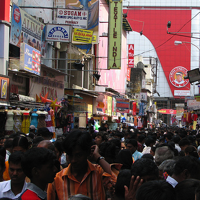
When most people think of revolutions, they imagine the overthrow of political orders. By contrast, most of what we see today in globalization’s continued expansion is not violent political revolution, but rather unsettling socio-economic revolution. Yes, when existing political orders cannot process that change — and the angry populism that typically accompanies it — they can most definitely fall. This is what we have seen in the Arab Spring to date. But more often this populism leads to political paralysis in countries both democratic and authoritarian. A case in point is the recent controversy in India over Prime Minister Manmohan […]
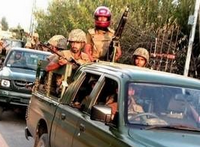
Last Tuesday’s deadly attacks on Shiite processions in Kabul and Mazar-e Sharif in Afghanistan are further evidence of dangerous instability in neighboring Pakistan and of the Pakistani state’s failure to act coherently to counteract it. A clear understanding of the group responsible is important to understanding the crossborder ramifications of the attacks. Contrary to reports in prominent news outlets, the Pakistani Sunni sectarian terrorist group Lashkar-e Jhangvi (LeJ) was not responsible for the attacks. Rather, an LeJ splinter group known as Lashkar-e Jhangvi al-Alami (LeJ-A) — not the original LeJ organization — has claimed responsibility for them. A person claiming […]

The recent elections in Egypt and Russia have important lessons for both Washington and Beijing about the contour of politics in the 21st century — and the limits of both authoritarianism and Western-style liberalism. For the past 12 years, as part of its campaign to modernize Russia, the Kremlin has encouraged the spread of new communications technology. However, over the course of his time first as president and then as prime minister, Vladimir Putin’s concern with mass communications focused primarily on shaping television coverage. Meanwhile, the growth in Russians’ mobile phone usage, in particular, has been quite dramatic. If less […]
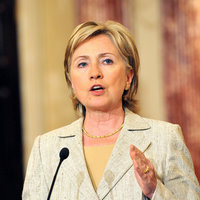
In the Nov. 22 Republican presidential debate, several candidates argued that the U.S. can no longer afford its foreign aid budget. In previous debates, former Massachusetts Gov. Mitt Romney went even one step further, explaining that the United States should not borrow money from China just to give it to other countries as aid. Instead, he argued, we should let the Chinese give aid directly to foreign countries if that is what they want to do. Romney is right to mention China, but he draws the wrong conclusion. China already provides large amounts of aid to countries throughout the developing […]
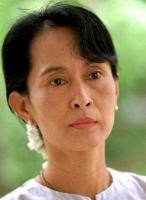
Last week’s historic visit to Myanmar by U.S. Secretary of State Hillary Clinton represents the culmination of the Obama administration’s policy shift toward the pariah state. Launched in September 2009 to establish a new starting point in the relationship between the two countries, the engagement with Myanmar is part of the broader U.S. effort to play a primary role in the fast-evolving Asia-Pacific region. By contrast, the European Union seems unable to keep up with the economic and political changes taking place in Asia, and instead appears simply to follow Washington’s lead without needed policy debates within the union. EU […]
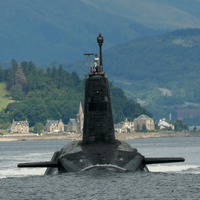
The sinking of the South Korean corvette Cheonan by a North Korean submarine in March 2010 has already been recognized as a human tragedy and a significant escalation by Pyongyang in its multi-decade confrontation with Seoul. But in the years ahead, the Cheonan incident may come to be remembered more as the inaugural event in a new era of subsurface naval competition and confrontation in the Asia-Pacific region. Asia’s rising powers are investing in submarine capabilities at unprecedented levels, and the nature of this investment is fundamentally changing the region’s subsurface environment. While this trend is certainly part of a […]
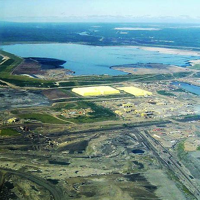
The United States is on the verge of an industrial renaissance, according to energy experts enthusiastic about technological advances surrounding the “fracking” of shale gas and the processing of “tight oil.” America is sitting on a century-worth of natural gas, and the Western hemisphere boasts five times the reserves in unconventional oil as the Middle East claims in the conventional category. Suddenly, all our fears of resource wars with China and never-ending quagmires in Southwest Asia seem to melt away, heralding with great certainty another American century based on the promise of energy independence. As “deus ex machina” moments go, […]
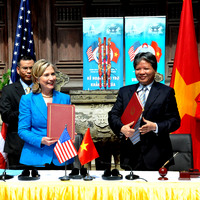
A look at Vietnam’s recent diplomatic moves shows Hanoi increasingly diversifying and intensifying its relations with major powers, a pattern that should be seen as an effort by Hanoi to deal with a more forceful China. Like many countries in the region, Vietnam is increasingly dependent on either direct or indirect economic links with fast-growing China. Furthermore, Vietnam’s political and economic system is similar to — if not modeled after — China’s. Maintaining a friendly relationship with their big neighbor is therefore the top priority of Vietnam’s leaders. Both sides have officially pledged to build a comprehensive partnership, guided by […]
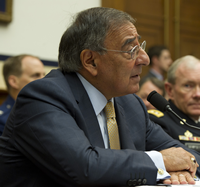
If national security flows from economic strength, then the ongoing global economic crisis is poised to strike at one of the more underappreciated tools in the security kit — the checkbook. We’re all familiar with the term “checkbook diplomacy.” But “checkbook security” has played a largely unsung role in America’s approach to national security over the past decade — from “buying off” Sunni insurgents in Iraq as part of the Surge to funding development projects in Afghanistan as part of the war effort to helping countries in Latin America and Africa improve their capabilities to fight drug traffickers and organized […]
Australia recently sent two naval ships to participate in a joint naval exercise with Indonesia. In an email interview, Fergus Hanson, director of polling and a research fellow at the Lowy Institute for International Policy, discussed Australia-Indonesia relations. WPR: What is the recent trajectory of Australia-Indonesia relations? Fergus Hanson: Australia-Indonesia relations remain caught in a deep rut. At a people-to-people level there is entrenched distrust. Polling in both countries reveals widespread negative perceptions and suspicions of the other country. Each year since 2006, the Lowy Institute Poll has asked Australians to rate their feelings towards Indonesia on a zero to […]
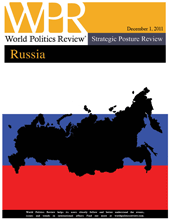
Editor’s note: This is an updated version of Richard Weitz’s “Strategic Posture Review: Russia,” published in February 2009. In light of the imminent return of Prime Minister Vladimir Putin to the Russian presidency, it is worth revisiting the mixed legacy of his previous eight years in that office and highlighting the significant changes in the regional and global environment that have impacted Russia’s foreign and defense policies in the four years since he left it. Upon assuming office on May 7, 2000, Putin began a major campaign to restore the authority of the Russian presidency, which had waned under the […]
